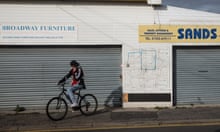Women are increasingly forced to take up sex work to get money for food and rent after becoming desperate over financial hardship caused by universal credit, an MPs’ committee has heard.
A series of witnesses from specialist charities that work with women involved in prostitution told MPs on the work and pensions committee there was a strong link between benefits changes and so-called “survival sex”.
They gave examples of women who had gone into sex work for the first time or returned to prostitution after several years out after experiencing financial precariousness caused by long waits for universal credit payments or as a result of benefit sanctions.
“What we are told time and time again by women we are supporting is that they are getting involved in sex work because of issues within universal credit,” said Laura Seebohm of the Changing Lives charity.
Seebohm said more women using the charity’s services reported that desperate poverty had driven them to sell sex. It could be be sex for cash, or “sex for laundry, a bottle of cider, or for food,” she said. “One woman we took to a food bank in Doncaster said: ‘I don’t have to sell sex now.’”
The committee launched its inquiry in March in response to what it called “shocking reports” from grassroots charities that benefits reform was forcing women to sell sex for cash, food or somewhere to sleep. It will examine whether the design of universal credit directly causes people to turn to survival sex.
The UN rapporteur on poverty Philip Alston reported meeting people who “have sold sex for money or shelter” during his visit to the UK last year. His final report, published on Wednesday, highlights how austerity has disproportionately hit poor women, especially single mothers, who he says would appear to have been “intentionally targeted”.
Niki Adams of the English Collective of Prostitutes, told the committee that many sex workers were mothers and this intensified the desperation caused by poverty. “You can go without a meal but if you know your kids are not going to be eating that’s a completely different level of pressure.”
Helen McDonald of the Nordic Model Now! group said women were not necessarily turning to prostitution to get cash. “It might be for somewhere to sleep … or to get food … They are expected to perform sex acts to get their dinner.”
The Department for Work of Pensions, in its written evidence to the committee, has denied a link between universal credit and survival sex for which it claims there is only anecdotal evidence. It said increases in prostitution had historically always been attributed to poverty associated with welfare systems.
Amber Wilson of the charity Basis Yorkshire said there had been reports in the past that shortage of money caused by the bedroom tax had driven women to sex work. However, there were design features unique to universal credit – for example payment delays and high levels of deductions – “that made it an even bigger barrier”.
Sarah McManus, chief executive of A Way Out said financial hardship caused by central elements of the design of universal credit, such as the five-week wait for a first payment was “increasing the frequency of sex working.”.
The committee heard that many vulnerable women felt intimidated and excluded by the complexity of applying for universal credit, the unpredictability of the payments when they were on it, and the hostility some experienced in their interactions with job centre staff.
Blair Buchanan, an organiser for the Sex Worker Advocacy and Resistance Movement (Swarm), said some women were choosing not to apply for universal credit at all because they were “scared of being caught up in a system that is ultimately going to alienate and dehumanise them”.
Raven Bowen, chief executive of the charity National Ugly Mugs, said sex work was embedded in wider social inequality. “We are looking at wage caps, insecure work, benefit caps, austerity and all these other threads. It’s a pressure cooker out there.”










